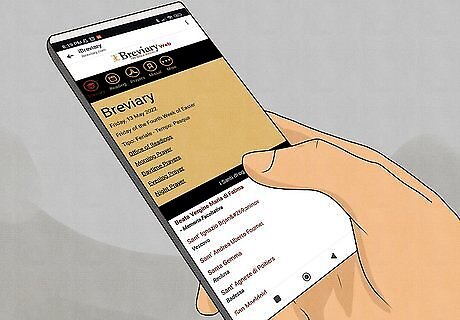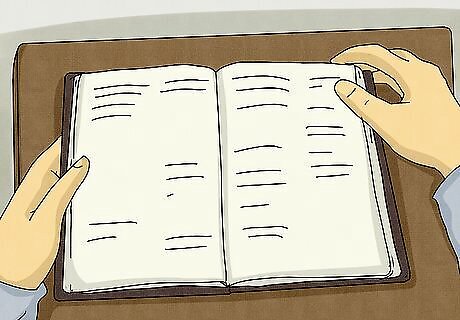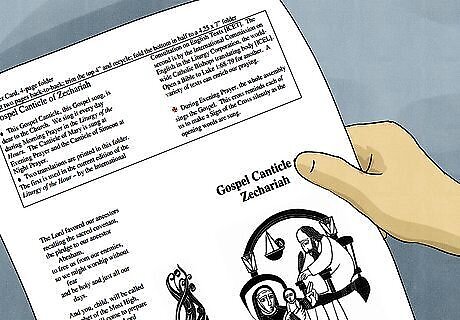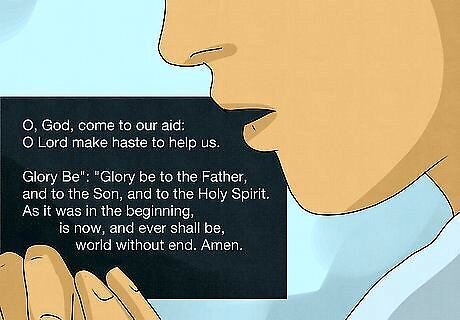
views
What is the Liturgy of the Hours?

The Liturgy of the Hours is the daily prayer of the Catholic Church. By praying throughout the day at set intervals, the Liturgy of the Hours is a way for Christians to follow St. Paul’s exhortation to “pray without ceasing” (1 Thess. 5:17). The Liturgy of the Hours is also called the Divine Office.

There are 7 hours in the Liturgy of the Hours, or times to pray. These hours are broken up into the 3 major hours, and the 4 minor ones. The goal of the Liturgy of the Hours is to unite everyone in the Catholic Church—all clergy are committed to praying the major hours, and are encouraged to pray 1 or 2 minor hours as well. Even though the Liturgy of the Hours is required for clergy and others living a consecrated life, laypeople can also benefit a lot from the practice.
Praying the Major Hours

Set aside 3 times a day to pray. Although the timing for each of the hours in the divine office is not strict, it can help you form a routine to pray at the same time each day. Keep in mind that the major hours may take you longer to pray than the minor hours—set aside 15-20 minutes for each hour. Although you can adjust this schedule as you need, the general timing for each of the major hours is as follows: The Office of Readings: Can be prayed at any time of day, but normally prayed immediately before the Office of Morning Prayer. You may also choose to do this prayer at night, before you sleep. The Office of Morning Prayer: Also known as Lauds, it is generally prayed at around daybreak, or 6 a.m. If waking up early is difficult for you, you can also pray this office the night before. The Office of Evening Prayer: Also referred to as Vespers, it is normally prayed at sunset, or around 6 p.m.

Obtain a physical or digital breviary. Your breviary is a collection of prayers that you use whenever you need to pray the Liturgy of the Hours. There are two options for a physical breviary: the single-volume Christian Prayer and the four-volume Liturgy of the Hours. If you’re using a physical breviary, it’s important to have a guidebook to help you find the proper prayers for the day. Your church may have a guidebook for you to follow, or you can pick up a copy of the Saint Joseph Guide for the Liturgy of the Hours. If you’d prefer the convenience of a digital breviary, consider downloading a smartphone app or visiting a website like iBreviary.

Open your guidebook to the current date if using a physical breviary. Your guidebook will direct you to the proper prayers for the day. A new edition of the guidebook comes out every year, so be sure to have an updated version. If you belong to a specific church, they might have their own schedule of prayers for you to use. Your guidebook will have two options: one set of prayers for the single-volume Christian Prayer, and another set of prayers for the four-volume Liturgy of the Hours. A digital breviary will automatically provide you with the proper prayers for the day, which means you won’t need a guidebook.

Begin your first prayer of the day with the Invitatory. The first office of the day may be either the Office of Readings or Morning Prayer, depending on your schedule. Regardless of which office you choose to start with, recite the following invitatory: Begin by saying, “Lord open our lips, and we shall praise your name.” Say the antiphon: “The Lord is the king of martyrs: come, let us adore him, alleluia.” Then, recite Psalm 94 (95) (“Come, let us rejoice in the Lord…”) If you’re praying with others, repeat the antiphon after every verse. If you’re by yourself, just once at the beginning is okay.

Start all other major hours with the opening versicle. If this isn’t the first office you’re praying today, begin with the opening versicle in place of the Invitatory. If you’re praying two hours back to back at the beginning of the day—like the Office of Readings and the Office of Morning Prayer—there’s no need to recite the opening versicle before the second prayer, since the Invitatory will stand in for your opening. Recite the opening versicle as follows: Start by saying, “O, God, come to our aid: O Lord make haste to help us.” Recite the “Glory Be”: “Glory be to the Father, and to the Son, and to the Holy Spirit. As it was in the beginning, is now, and ever shall be, world without end. Amen.” As you recite the prayer, bow your head when you say “Father,” “Son,” and “Holy Spirit.”

Follow the readings prescribed in your guide. The major hours are comprised of several different prayers, and your guidebook will help you navigate to the right ones. Follow the instructions from your guidebook to find which prayers are required for each office of the day. Your guidebook will also tell you when there are special feast days, which will call for a different set of prayers for the major hours: A selection of hymns A Psalm A passage from scripture A responsory (not included in the Office of Readings)

Pray the canticles to finish Lauds and Vespers. For 2 of the major hours (not the Office of Readings), end your prayer session with a canticle. These canticles are not listed in your guidebook, but you can follow the links below to find them. The Canticle of Zechariah, to be prayed after Lauds. The Canticle of Mary, to be prayed after Vespers.
Praying the Minor Hours

Schedule in time for the remaining hours. While the major hours are highly encouraged in the Catholic Church, the minor hours are optional. Choosing a single hour is enough, or you may even choose to pray multiple minor hours in one session. Unlike major hours, minor hours won’t take you much longer than 10 minutes to complete. If you want to pray the minor hours at their traditional times, schedule them in each day at each of the following times: The Office of Midmorning Prayer: Known as Terce, this prayer normally occurs around 3 hours after sunrise, or 9 a.m. The Office of Midday Prayer: Called Sext, this prayer takes place around noon. The Office of Midafternoon Prayer: Also known as None, this prayer occurs around 3 p.m. The Office of Night Prayer: Also called Compline, this prayer happens before you sleep, or around 9 p.m.

Recite the opening versicle. Minor hour prayers always begin with the opening versicle, which follows the same format as the versicle used for the major hours. It proceeds as follows: Start by saying, “O, God, come to our aid: O Lord make haste to help us.” Recite the “Glory Be”: “Glory be to the Father, and to the Son, and to the Holy Spirit. As it was in the beginning, is now, and ever shall be, world without end. Amen.” When saying the prayer, bow your head when you say “Father,” “Son,” and “Holy Spirit.”

Follow the readings prescribed in your guidebook or digital breviary. If using a physical breviary, find the current date in your guidebook (either the St. Joseph Official Guidebook or one from your church), then navigate to the correct passages. A digital breviary will provide you with the proper prayers directly. The readings should cover the following material: A choice of a hymn A few Psalms A short passage of scripture A concluding prayer




















Comments
0 comment